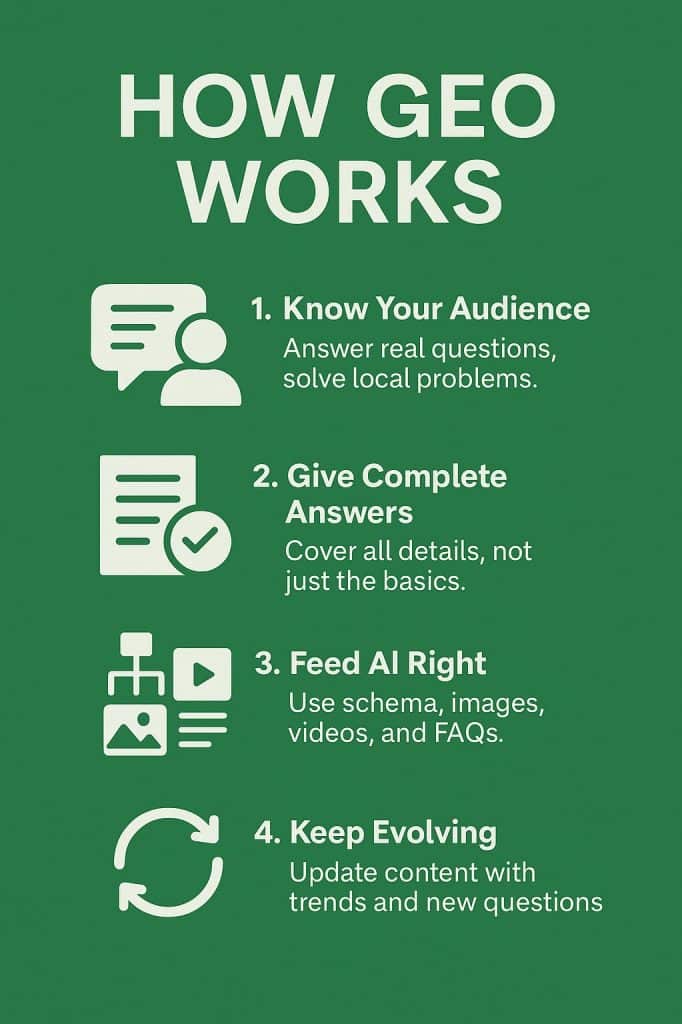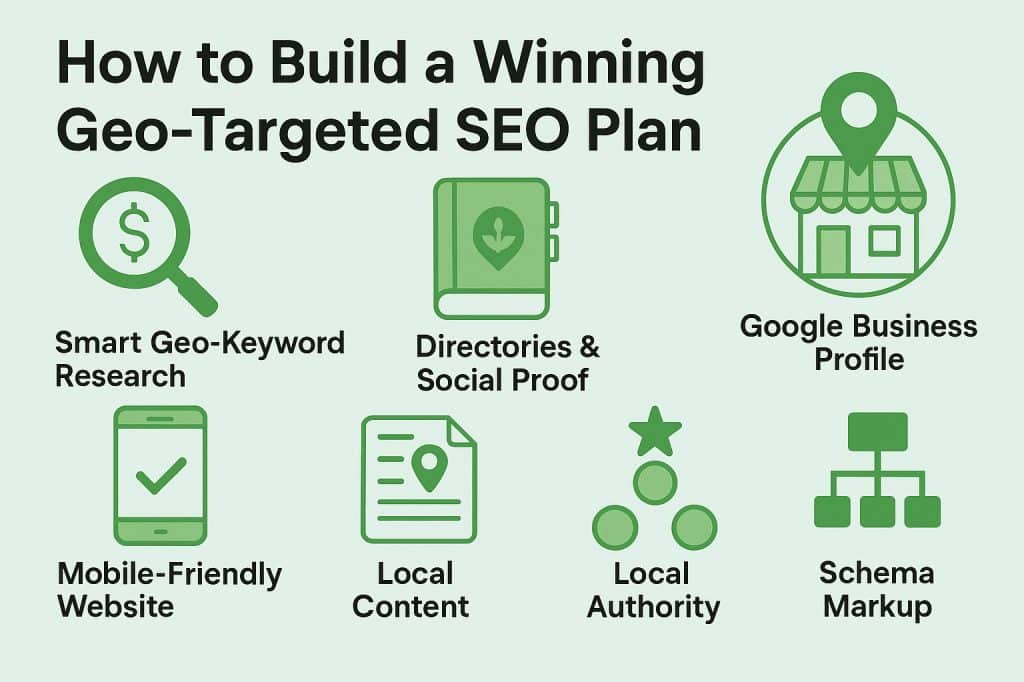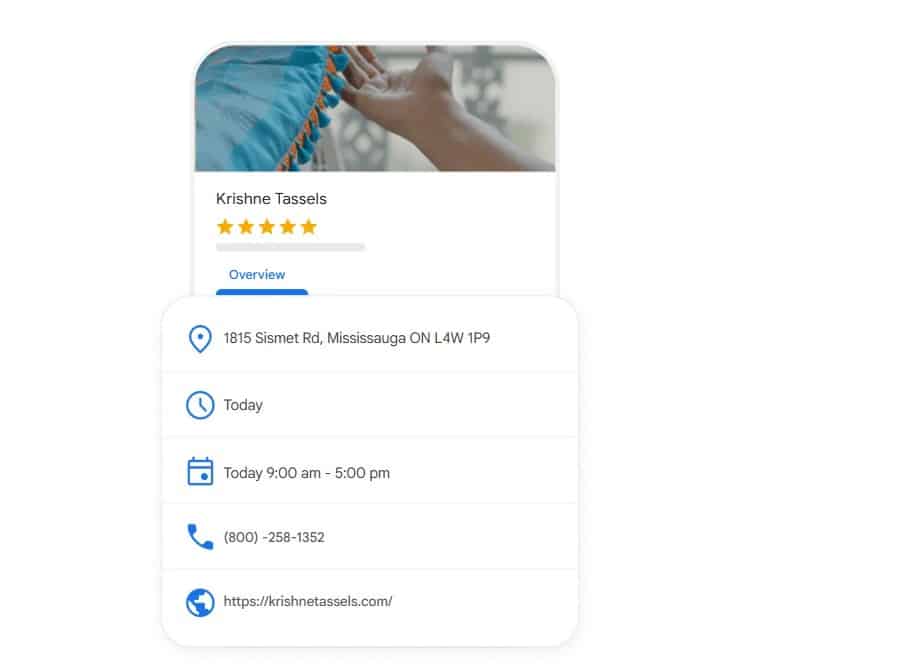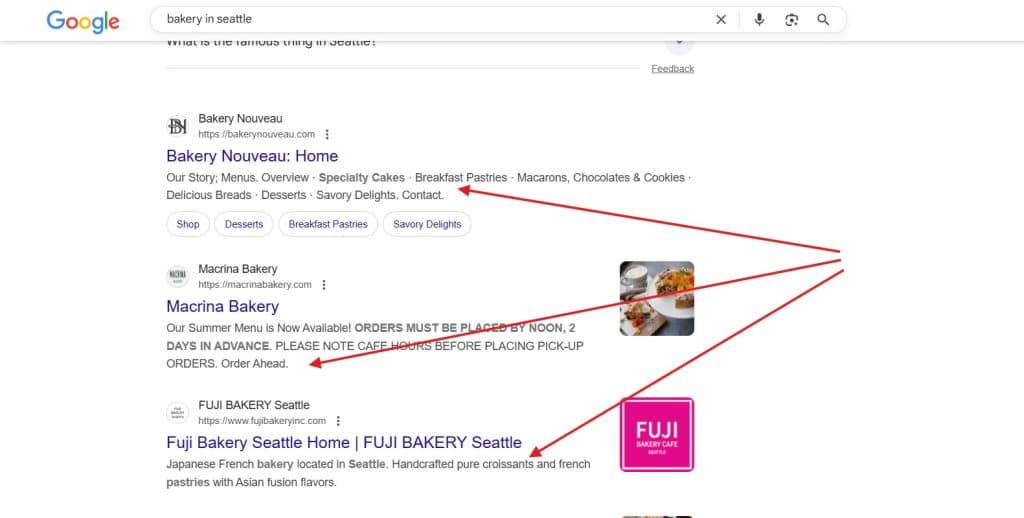TL;DR
- Geo SEO ensures your business shows up when local customers search, while GEO (Generative Engine Optimization) makes your content AI-friendly and trustworthy.
- Focus on intent-driven content, complete answers, structured data, and multi-format content (images, videos, FAQs) to boost AI citations.
- GEO complements, not replaces, traditional SEO, use geo-targeted keywords, Google Business Profiles, local directories, and schema markup for maximum reach.
- Create location-specific content, mobile-friendly sites, and local backlinks to increase authority and conversions.
- Partner with Wild Creek Web Studio to implement these strategies and ensure your brand dominates both local search and AI-powered results.
The way people search is changing. Many still turn to Google for local recommendations, but 71.5% of users now report using AI tools for search, and 14% use them daily. If your business isn’t showing up in both, you’re missing opportunities.
That’s where Geo SEO and Generative Engine Optimisation (GEO) come in. Geo SEO helps local customers find you when they’re ready to act, while GEO makes sure AI( Artificial Intelligence) platforms choose your content as a trusted answer.
In this blog, we’ll cover what is GEO and how does it work? Not just that, we’ll also see how it differs from traditional SEO, how GEO works, and how to create AI-friendly local content that keeps your brand visible everywhere people search.
What Is Generative Engine Optimization (GEO)?
So, what is geo SEO and how does it work? Geo SEO is about making sure your business appears exactly when local customers are looking for you. Instead of chasing broad, generic keyword rankings, it focuses on connecting with people in specific locations, the ones most likely to convert.
Generative Engine Optimisation (GEO) is changing SEO by using Generative AI models to improve how content is seen. It is a new idea that uses AI engines, like Generative AI and Large Language Models, to create detailed answers GEO focuses on making unique words and providing relevant information to get greater visibility in search results
This is often done with SEO geo targeting strategies like geo tag integration SEO, geo meta tags SEO, and geo sitemap in SEO to help search engines understand your location relevance.
There is also a benefit of using geo tag in image as a SEO for local image discovery, as it helps search engines link your visuals to a specific location, boosting local and AI-powered search visibility.
How GEO Works?

Infographic of how GEO works
If you want AI-powered search to feature your business, you need to understand how generative engines process, select, and present information. GEO (Generative Engine Optimization) is not just SEO with a twist. It is a shift in focus from chasing keywords to delivering value that AI can clearly interpret and trust.
Example: If you’re doing SEO for more than one geographical market, you’d structure location-based landing pages with geo-targeted keywords and structured data for each location.
Here’s what actually drives it:
1. Crack The Code On What Your Audience Wants Most
In GEO, the starting point is not “Which keyword do I want to rank for?” but “What problem is my audience trying to solve right now?” Generative engines like ChatGPT and Gemini are built to interpret search intent. If someone searches “best same-day flower delivery in Boston,” the AI aims to match them with a trustworthy answer that is specific, local, and helpful.
- For businesses, this means researching the real questions your audience asks, mapping them to different stages of the buying journey, and creating direct, no-fluff answers.
- The more precisely your content aligns with their intent, the higher your chances of being featured.
2. Hook AI With Complete, Rich Answers
Traditional SEO could sometimes get away with keyword repetition, but generative engines look for completeness. They scan for well-structured, well-rounded explanations that answer not only the main question but also related follow-ups.
- If you run a dental clinic and write about “teeth whitening in Delhi,” you should not stop at procedure details. You would also want to cover cost, expected results, aftercare tips, and patient testimonials.
- The deeper and more holistic your coverage, the more valuable it becomes for AI, which wants to give users everything they need in one go.
3. Feed AI Exactly What It Loves
AI systems do not just process text. They draw from structured data, visuals, videos, and publicly available datasets. The more formats you use, the easier it is for AI to find and validate your information.
- Adding schema markup helps AI instantly understand your business hours, location, and services.
- Photos, infographics, and how-to videos give extra context.
- Embedding FAQs directly into your page structure makes it simple for AI to lift answers word-for-word.
4. Evolve Faster Than AI Changes
Generative engines are continuously retraining on new data, which means the ranking factors and preferred content formats can shift quickly. A GEO strategy is not something you “set and forget.” It is something you refine regularly.
- Monitor how your content performs in AI platforms every month.
- Update older pages to include new customer questions or industry trends.
- Test different answer formats such as short direct summaries and detailed explanations to see what gets picked up.
Bottom line: GEO works by making your content the most relevant, reliable, and easy-to-use resource for both AI and humans. If you consistently deliver on intent, depth, variety, and adaptability, you give AI every reason to feature your business.
Ready to get found by more local customers? Boost your visibility with our SEO services
How GEO differs from SEO?
| Aspect | Search Engine Optimisation | GEO (Generative Engine Optimisation) |
| Primary Focus | Ranking high in Google search engine results | Being cited in AI-generated answers |
| How It Works | Uses keyword optimisation, backlinks, and site structure to climb search rankings | Structures content for conversational queries, uses AI schema for GEO SEO, and ensures clarity for AI platforms |
| Key Outcome | Increased visibility in traditional search results | Increased authority and exposure through AI citations |
Now the most asked question is GEO replacing SEO? The table makes the differences clear, but SEO and GEO are not in competition. Both rely on strong keyword research, high-quality content, and a technically sound website.
The key change with GEO is in delivery. Instead of only aiming to satisfy search engines, you are making your content easy for AI to understand, trust, and present in its answers.
By combining traditional SEO best practices with GEO-specific strategies such as structured data and conversational content, you can secure visibility in both search results and AI-generated responses, reaching your audience in more places than ever.
How Can GEO Boost Your Brand’s Visibility?
GEO is becoming a must-have if you want your brand to show up where people are actually looking. This applies to both geo SEO and generative engine optimisation for AI-powered search.
AI-driven search results are now a major part of the customer journey. Showing up in those generative answers means you can reach your audience even if they never click on a traditional Google listing. When your content is recognised and cited by AI, it builds authority, boosts local SEO, and keeps your brand in the conversation.
Top brands are already doing this by:
- Optimising FAQs so AI can pull clear, ready-to-use answers
- Using geo sitemap and geo meta tags to improve location signals
- Adding geo tags in images for SEO to reinforce location-based relevance
- Keeping local profiles active to stand out in location-based searches
When GEO works, here’s what you gain:
- Engage more users with location-specific content that feels relevant
- Climb higher in both traditional search engines and AI-powered search results
- Add depth with structured answers that build authority
- Boost visibility as AI platforms showcase your brand
- Increase conversions by meeting specific local needs
How Generative AI And Answer Engines Work?
Generative AI engines, like ChatGPT or Gemini, run on advanced language models trained on huge amounts of data. These models learn patterns, context, and meaning from the information they process.
When someone asks a question, the AI does not just pull one source, it blends all the detailed information from many places to create a clear, detailed answer. For geo-generative SEO, you must also optimise local data, visuals, and structured content to be AI-readable.
Now, for marketers, this changes the game. If you want your website content to be part of those AI-generated answers, you need to think beyond traditional keywords. Focus on:
- Using natural, conversational language that matches how people actually ask questions
- Providing structured data such as schema markup so AI can easily interpret your content
- Delivering factual, well-cited answers that position you as a trustworthy source
The clearer and more user-focused your content, the more likely AI is to pick it up, which means more brand engagement, brand visibility, more authority, and more opportunities to connect with your audience.
How Do You Build a Winning Geo-Targeted SEO Plan?

Infographic showing how to Build a Winning Geo Targeted SEO Plan
Some experts ask Is SGE & GEO the Future of SEO? with both working together to reshape visibility. By 2026, traditional search engine volume will drop by 25%, with search marketing losing market share to AI chatbots and other virtual agents. That makes mastering geo-targeting SEO now more critical than ever.
So, how can businesses benefit from implementing geo SEO strategies? Here’s what your geo-targeted SEO strategy needs to truly capture local search visibility:
1. Pinpoint Your Audience With Smart Geo-Keyword Research
Your keywords aren’t just words, they’re directions for search engines and signals to potential customers.
- Think beyond generic product names. If you run a Mumbai bakery, keywords like “wedding cakes” aren’t enough. Focus on local intent: “bakery in Mumbai” or “Mumbai wedding cakes.”
- Don’t forget voice search. People might say, “Hey Google, find a bakery Near me.” Long-tail phrases like this can make a huge difference and it also works best as a local SEO strategy.
- Use your keywords strategically in headings, website copy, meta tags, alt text, and URLs.
Pro Tip: Build a geo-keyword list for each neighborhood or district you serve. Micro-targeting boosts local relevance.
2. Leverage Local Directories and Social Proof

reviews
Directories like Yelp, TripAdvisor, and Google Business Profile do more than list your business, they amplify visibility.
- Ensure your NAP (Name, Address, Phone) is consistent everywhere.
- Encourage customer reviews: they influence rankings and conversions.
- Highlight collaborations with local events or causes. It reinforces your local presence and strengthens your community ties.
Pro Tip: Set up alerts to respond to every review within 24 hours. Quick responses signal professionalism to both users and search engines.
3. Shine In Local Search With A Fully Optimised Google Business Profile

Google Business Profile
Your Google Business Profile (GBP) is your digital storefront. Many people see it before they visit your website.
- Include accurate business details, hours, services, and photos.
- Use AI tools like to craft a geo-focused, engaging profile.
- Collect and manage reviews. Positive customer reviews build trust, while thoughtful responses to negative reviews demonstrate credibility.
- Post local updates on your GBP, like promotions, events, or seasonal offerings.
Pro Insight: GBP posts show up in search results. Regular updates increase clicks and conversions.
4. Make Your Website Mobile-Ready And Easy To Navigate
Most local searches happen on mobile, often on the go. If your site is hard to use, you lose customers fast.
- Use fast-loading pages. A few seconds of delay can make visitors bounce.
- Make your website responsive so it looks perfect on any screen.
- Ensure directions, click-to-call buttons, and contact forms are easy to find.
Pro Insight: Google favours mobile-friendly sites in local rankings, so this isn’t optional, it’s essential.
5. Create Local Content That Connects
Content is how your business talks to the community. To stand out:
- Write blogs about local events, news, or trends that relate to your business.
- If you have multiple locations, create location-specific landing pages so visitors feel they’re in the right place.
- Use geo-relevant visuals: local landmarks, staff in the community, or photos of your store.
Pro Insight: Local content doesn’t just help SEO. It builds trust, authority, and a sense of community.
6. Build Local Authority With Partnerships and Backlinks
Search engines love sites that are trusted by the local community:
- Partner with local businesses, blogs, and organizations for backlinks.
- Sponsor community events to gain mentions and links.
- Engage in local forums or social media groups to increase visibility and engagement.
Pro Tip: Even a small backlink from a respected local source can boost your authority and rankings significantly.
7. Boost Visibility With Local Schema Markup

Local schema markup
Schema markup is structured data that helps search engines understand your business better.
- Include name, address, phone, business type, and reviews.
- Schema can increase your chances of rich snippets, like maps, stars, and events, in search results.
- Implementation can be done by a developer or using tools if you’re comfortable with code.
Pro Insight: Even simple schema, like adding your location and contact info, can give you a competitive edge in local SEO.
Remember, for small businesses, it’s not only about ranking better, it is about being the obvious choice when someone nearby is ready to buy. And, GEO targeting SEO and GEO specific SEO strategies ensure your business appears in local search packs, Google Business Profile, and generative AI recommendations.
Note: Be mindful of GEO blocking and Google seo, since access limits can affect how pages are crawled, indexed, and shown across regions.
Is Wild Creek The Partner Your Business Needs To Stand Out?
If you want more people to find you, whether they are right around the corner or halfway across the globe, Wild Creek Web Studio can help you get there.
They combine proven strategies to strengthen your digital presence, including:
- Content optimisation that makes your website more engaging and relevant
- Quality link building to boost authority and trust with search engines
- Technical SEO fixes that ensure smooth crawling, indexing, and performance
The result?
A stronger overall online presence that:
- Lifts your rankings in traditional search results
- Naturally improves geo-targeting SEO and geo local SEO performance
- Increases your chances of appearing in AI-powered search results
With Wild Creek in your corner, you are not just competing, you are leading the way in connecting with the right audience, wherever they are.
So, let’s put your business on the map. Reach out to us Today!
Final Thoughts
GEO SEO and its related strategies like GEO search SEO and GEO local SEO is changing the way brands get found. It is no longer just about ranking on page one. It is about appearing in the AI-generated answers, map packs, and local results where decisions are made in seconds.
By creating content that is easy for both humans and AI to understand, you can secure trust, boost visibility, and connect with potential customers at the exact moment they are ready to act. The brands that embrace this shift now will be the ones leading the conversation tomorrow.
Frequently Asked Questions
What is the GEO full form in SEO?
In SEO, GEO stands for Generative Engine Optimisation. It is a modern search strategy that optimises your content for AI-driven search engines, answer engines, and tools like ChatGPT, Perplexity, and SGE, ensuring your site is easily interpreted, cited, and trusted.
Is generative engine optimization (GEO) or AI search optimization really a thing?
Yes. Generative Engine Optimization (GEO) is an emerging practice focused on optimizing content specifically for AI-powered search engines and virtual assistants. It goes beyond traditional SEO by targeting user intent, structured data, and formats that AI can easily interpret and feature.
What is the difference between geo-targeted keywords and traditional SEO keywords?
Geo-targeted keywords are phrases linked to specific locations, such as “best pizza in Delhi,” while traditional SEO keywords are broader. GEO SEO focuses on local search results, using location-specific terms to improve search rankings and reach audiences looking for nearby services or products.
Will GEO displace SEO as the biggest source of traffic?
GEO will not replace traditional SEO, but rather integrate with it as search behaviour evolves. Generative AI and new paradigms in content creation mean that both methods will work together, ensuring brands remain visible in both classic and AI-driven search environments.
What are some examples of successful GEO SEO strategies in India?
Successful GEO SEO strategies in India include optimising Google Business Profiles for city-specific searches, creating location-based landing pages (e.g., “cafes in Bangalore”), targeting voice search queries like “near me,” leveraging local directories such as Justdial and Sulekha, and earning backlinks from regional news portals or community sites.
What trends should marketers watch for in GEO SEO in 2025 and beyond?
In 2025 and beyond, expect geo SEO to focus on AI-driven generative models, enhanced user experience, and deeper local engagement. Best practices will include structured data, mobile optimisation, and continuous monitoring, as voice and visual search further shape the digital marketing landscape.
What is geo-generative SEO, and how is it transforming local search?
Geo-generative SEO blends traditional geo-targeted optimisation with AI search readiness. It ensures your local content, such as business details, reviews, and service pages, is structured so AI tools can pull and recommend it when users request local suggestions.
Is GEO more effective than SEO?
GEO is not universally more effective, but it can outperform traditional SEO in AI-driven environments where structured, conversational, and intent-rich answers are prioritised over keyword-heavy content.
Does the geo sitemap help in local SEO?
Yes. A GEO sitemap provides search engines with structured information about your locations, service areas, and coordinates, improving local ranking signals and increasing the likelihood of appearing in map packs and location-based AI answers.
How to target SEO for more than one geographical market?
Create separate location-specific landing pages with unique content, local keywords, and structured data for each market.
What tools are available to optimize your website for GEO SEO?
Google Business Profile, Semrush, Ahrefs, Moz Local, and BrightLocal are popular for local keyword research, citations, and ranking tracking.
Does AI Schema make any difference for GEO/ AI SEO?
Yes. AI-friendly schema like LocalBusiness and FAQPage helps generative engines understand, cite, and rank your content more accurately.
How will GEO redirection affect SEO?
If implemented correctly, GEO redirection can improve user experience by showing region-specific content without harming rankings. Poor implementation can block crawlers and hurt visibility.
Is GEO the Future of Content Marketing?
It is becoming a core part of content marketing by ensuring AI and search engines feature your content in relevant local and generative results.

1 comment
Great points explained here. SEO services are essential for every business today, especially when competing in digital markets. Helpful read!